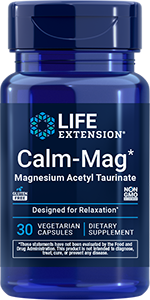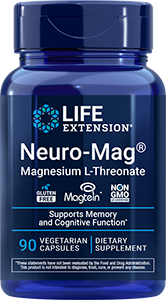
Is Magnesium Calming?
Published: August 2022
Magnesium is involved in over 300 biochemical reactions in the body. Abbreviated on the periodic table of elements as "Mg," this versatile mineral is essential for nerve and muscle function, cardiovascular and brain health, energy production, building proteins, muscle growth, supporting already-healthy blood sugar, maintaining sturdy bones…and the list keeps going. Not only that, but magnesium also helps promote relaxation. And in these hectic times, who doesn't need a little more tranquility in their life?
Can you eat your way to a more "zen" mental state? Indeed, there are several magnesium-rich foods, such as beef, fish, poultry, dark leafy greens, nuts, legumes, seeds, whole grains—even 70% dark chocolate. Still, about two-thirds of the Western population doesn't consume enough magnesium; and magnesium deficiency can impact aspects of your health, including unmanaged stress. Whether it's lifestyle, genetics, or low magnesium availability in foods, there are a number of different reasons why people may experience a magnesium deficiency.
The good news is that you can help your mind, muscles, organs (all of you) have enough magnesium available—with the right magnesium supplement. But between all the confusing choices—magnesium taurate, magnesium citrate and glycinate, magnesium acetyl taurate, magnesium threonate—how do you know which can help your mind and body relax?
Here's everything you need to know about how to choose the proper dosage and form of magnesium to help you kick back and unwind.
Why is magnesium calming?
When it comes to brain health, magnesium has two chief roles that may explain how it works as a calming mineral, influencing pathways associated with mood and relaxation.
Neurotransmitter release
—Magnesium helps maintain the activity of stimulating neurotransmitters like glutamate and binds to calming receptors in the brain, helping increase GABA activity (the main inhibitory neurotransmitter in the brain), promoting relaxed feelings and a more peaceful mental state.Hormone balance
—It also helps support the release of stress hormones like cortisol, which helps slow down the nervous system, promoting more calm feelings.
One caveat: to help your mind and muscles decompress, magnesium must reach your brain. And that's easier said than done. If you're thinking, "Great! I'll just add more magnesium-rich foods to my diet," you may be surprised. Farming processes can deplete the soil of magnesium, and even how you cook your foods can affect your magnesium intake from your diet.
That's why it's important to choose a supplement that delivers a form of magnesium that's bioavailable and easy for your brain to use. In other words, you're hacking natural biological processes by giving your body the type of magnesium that can reach the brain more efficiently.
Pro tip: When possible, choose foods and products with organic or non-GMO labels; they are certified to use organic ingredients and meet strict standards regarding soil conditions, pesticides, fertilizers and no growth hormones.
Which magnesium is best for relaxation?
A hectic day, along with unmanaged stress can impact magnesium levels. So, to keep your cool during those go-go-go days, you'll want to ensure your body has enough of this do-it-all-mineral. (You need a magnesium deficiency about as much as you need yet another chore added to your to-do list!)
Growing research has shown that magnesium acetyl taurate (sometimes called magnesium acetyl taurinate) can cross the blood-brain barrier and significantly support magnesium levels in the brain, where it helps promote calming feelings.
Remember, a dietary magnesium supplement isn't a "magic bullet" that will ease frazzled feelings while the pot on the stove is overflowing because you had to tend to your crying toddler. Instead, a supplement should complement your dietary choices and daily habits that help you cope with the hustle and bustle of busy schedules.
Pro tip: You can take a quiz to help you find nutrients that can help you relax and ease your mood.
What is magnesium acetyl taurate?
Magnesium acetyl taurate, also known as magnesium acetyl taurinate, is a brain-friendly form of magnesium that's been shown to help the mind relax and encourage feelings of calmness. That's because the acetyl form of the amino acid taurine is more lipophilic or "fat loving," which means it can easily cross cell membranes and the blood-brain barrier.
Taurine is a sulfonic (or sulfur-containing) amino acid that can have neuroprotective effects and promote a healthy inflammatory response. Preclinical studies have shown that the amino acid taurine helps magnesium enter the brain, effectively increasing magnesium levels.
In other words, magnesium acetyl taurate is a combination of magnesium with acetyl taurine, which helps magnesium readily cross cell membranes for good bioavailability. Preclinical studies have also shown that the acetyl form of taurine is more effective at making magnesium available to brain cells than other forms of this mineral, including magnesium lactate, magnesium citrate, or magnesium glycinate.
Magnesium acetyl taurate and magnesium taurate: Are they the same?
No. Both forms of magnesium have been studied in similar contexts for cognitive health, muscle function, muscle growth, bone density, and cardiovascular health—like supporting already-healthy blood pressure. But the "acetyl" in the name is a significant distinction because it affects how it interacts with your body.
The amino acid taurine can transport magnesium in and out of cells, so it functions differently in different tissues. Magnesium taurate, for example, hasn't been shown to cross cell membranes or the blood-brain barrier like magnesium acetyl taurate. This means that magnesium taurate can't access the brain and positively affect mood or relaxed feelings.
However, magnesium taurate has been shown to confer cardioprotective benefits and help safeguard heart cells against oxidative stress; it's also been shown to support already-healthy blood sugar and blood pressure levels, and muscle contraction.
Explore Our Best Stress Management Supplements
What are the health benefits of magnesium acetyl taurate?
By providing enough magnesium to your brain, magnesium acetyl taurate offers three essential benefits that promote calmness:
- It helps support a healthy response to daily stress.
- By being available to the brain, it can help encourage calming feelings.
- It's been shown to promote the healthy activity of neurotransmitters like serotonin and GABA.
The high bioavailability of magnesium that the acetyl form of taurine provides the brain makes it an excellent choice for relaxation and mood support.
A preclinical study showed magnesium acetyl taurate was absorbed rapidly into brain cells and had the highest tissue concentration levels in the brain compared to other forms of magnesium. The result? Magnesium acetyl taurate was associated with increased markers of calmness and relaxation. And in a clinical study, magnesium acetyl taurate was shown to help relieve multiple markers of stress.
Additionally, another role of magnesium is to help support calcium intake, which is vital for bone density and muscle contraction, not to mention healthy brain-cell-to-brain-cell communication. How does calcium support communication between your neurons? This essential mineral is involved in the signaling and timely release of neurotransmitters.
Pro tip: Healthy magnesium levels are also associated with healthy vitamin D levels. Why do you want healthy vitamin D levels? The star player vitamin is also associated with supporting a healthy mood.
Is magnesium acetyl taurate safe to take?
Yes. Preclinical studies and a clinical trial have shown that the calming mineral combined with the acetyl form of taurine is well-tolerated; it's even gentle on the digestive system, so it won't get things "moving along" (if that's what you're seeking, try magnesium sulfate or magnesium malate instead). And thanks to that mind-gut connection, a happy gut means a happy mind.
Pro tip: Supplementing with the mighty mineral is easy and it confers whole-body health benefits; you'll find it in capsules, tablets and even magnesium powder!
Other forms of magnesium supplements
As we've seen so far, magnesium is fundamental for our well-being. Not only does it support the cardiovascular system, muscle health, bone density, digestion and cognition, but the proper form of magnesium can do wonders for your mood.
But before you start supplementing with it, make sure to speak with your doctor to find the best dosage and type of magnesium for your unique needs. Here are five types of magnesium supplements:
Magnesium L-threonate
—If you're looking for a brain boost, magnesium threonate has been shown to cross into the brain more efficiently than commonly used forms of magnesium. Double-blind studies have shown it positively affects memory and cognition health.
Pro tip: If capsules aren't your thing, you can also get l-threonate in magnesium powder form.Magnesium citrate
—Magnesium citrate supports already-healthy blood pressure and has been shown to promote bone strength and digestion. The citrate form of this mineral also helps avoid any deficiencies in your dietary choices.Magnesium malate
—This is a common dietary supplement that combines magnesium with malic acid. This form of magnesium has been shown to have health benefits, including supporting already-healthy blood sugar levels, exercise performance and muscle comfort.Magnesium glycinate
—Combining magnesium with glycinate can help make it more available for the body. Research has shown that this form of magnesium can potentially support cardiovascular health by supporting blood pressure already within a normal range, promoting bone density, and maintaining already-healthy blood sugar levels.Magnesium sulfate
—This supplement has been shown to help boost magnesium levels in the blood. Studies also show that it helps promote healthy sleep and digestion, and promotes muscle comfort.
If you're looking to manage daily stress, get a cognitive boost, or simply get enough elemental Mg, speak with your healthcare provider. They can guide you in choosing the right dosage and type of magnesium supplementation to help promote relaxed feelings, cognitive acuity, or healthy magnesium levels.
References
- Arfuzir, Nor Najwa Natasha et al. "Taurine Protects Against Retinal and Optic Nerve Damage Induced by Endothelin-11-in rats via Antioxidant Effects." Neural Regen Res., November 2018, https://www.ncbi.nlm.nih.gov/pmc/articles/PMC6183037/
- Ates, Mehmet et al. "Dose-Dependent Absorption Profile of Different Magnesium Compounds." Biol Trace Elem Res., December 2019, https://pubmed.ncbi.nlm.nih.gov/30761462/
- Boyle, Bernard Neil et al. "The Effects of Magnesium Supplementation on Subjective Anxiety." Magnes Res., March 2016, https://pubmed.ncbi.nlm.nih.gov/27869100/
- Fassin, Manon et al. "Effect of Oral Administration of Magnesium-Acetyl-Taurate on Synaptic Plasticity in Rodents." Manges Res., November 2020, https://pubmed.ncbi.nlm.nih.gov/33593714/
- John, Ju Chian et al. "The Role of Taurine in Mitochondria Health: More Than Just an Antioxidant." Molecules, August 2021, https://www.ncbi.nlm.nih.gov/pmc/articles/PMC8400259/
- Kirkland, Anna E et al. "The Role of Magnesium in Neurological Disorders." Nutrients, June 2018, https://www.ncbi.nlm.nih.gov/pmc/articles/PMC6024559/.
- Penckofer, Sue et al. "Vitamin D and Depression: Where Is All the Sunshine?" Issues Ment Health Nurs., June 2011, https://www.ncbi.nlm.nih.gov/pmc/articles/PMC2908269/
- Pickering, Gisèle et al. "Magnesium Status and Stress: The Vicious Circle Concept Revisited." Nutrients, December 2020, https://www.ncbi.nlm.nih.gov/pmc/articles/PMC7761127/
- Rowe, Keith. "Ease Occasional Anxiety & Improve Your Mood with Vitamin D." BrainMD, February 2019, https://brainmd.com/blog/ease-anxiety-with-vitamin-d/
- Sanchez, Stuart. "A Brain-Specific Magnesium Relieves Stress." Life Extension Magazine®, June 2022, https://www.lifeextension.com/magazine/2022/8/brain-magnesium-reduce-stress
- Schwalfenberg, Gerry K et al. "The Importance of Magnesium in Clinical Healthcare." Scientifica (Cairo). September 2017, https://pubmed.ncbi.nlm.nih.gov/29093983/
- Schuchardt, Phillipp Jan et al. "Intestinal Absorption and Factors Influencing Bioavailability of Magnesium-An Update." Curr Nutr Food Sci., November 2017, https://www.ncbi.nlm.nih.gov/pmc/articles/PMC5652077/
- Shrivastava, Parikshit et al. "Magnesium Taurate Attenuates Progression of Hypertension and Cardiotoxicity Against Cadmium Chloride-Induced Hypertensive Albino Rats." J Tradit Complement Med., June 2018, https://pubmed.ncbi.nlm.nih.gov/30963046/
- Uysal, Nazan et al. "Timeline (Bioavailability) of Magnesium Compounds in Hours: Which Magnesium Compound Works Best?" Biol Trace Elem Res., January 2019, https://pubmed.ncbi.nlm.nih.gov/29679349/
- Workinger, Jayme L. et al. "Challenges in the Diagnosis of Magnesium Status." Nutrients, September 2018, https://www.ncbi.nlm.nih.gov/pmc/articles/PMC6163803/
- "IIA.1 Calcium Influx: Initiation of Neurotransmitter Release." Williams.edu, https://web.williams.edu/imput/synapse/pages/IIA1.htm
- "Magneisum Glycinate & Glycine." Natural Calm, January 2018, https://naturalcalm.ca/about-magnesium-glycinate-glycine/
- "Scientific Opinion of the Panel of Food additives and Nutrient Sources Added to Food." European Food Safety Authority, January 2009, https://focalpointbg.com/images/stories/efsa/contents/pdfdocs/ans_ej947_Taurates_op_en.pdf
- "UTSW Researchers Solve Structure of Major Brain Receptor That Is Treatment Target for Epilepsy and Anxiety." UT Southwestern Medical Center, June 2018, https://www.utsouthwestern.edu/newsroom/articles/year-2018/brain-receptor-structure.html
Always be in the know!
Access the latest deals, wellness news, expert health tips & more!











